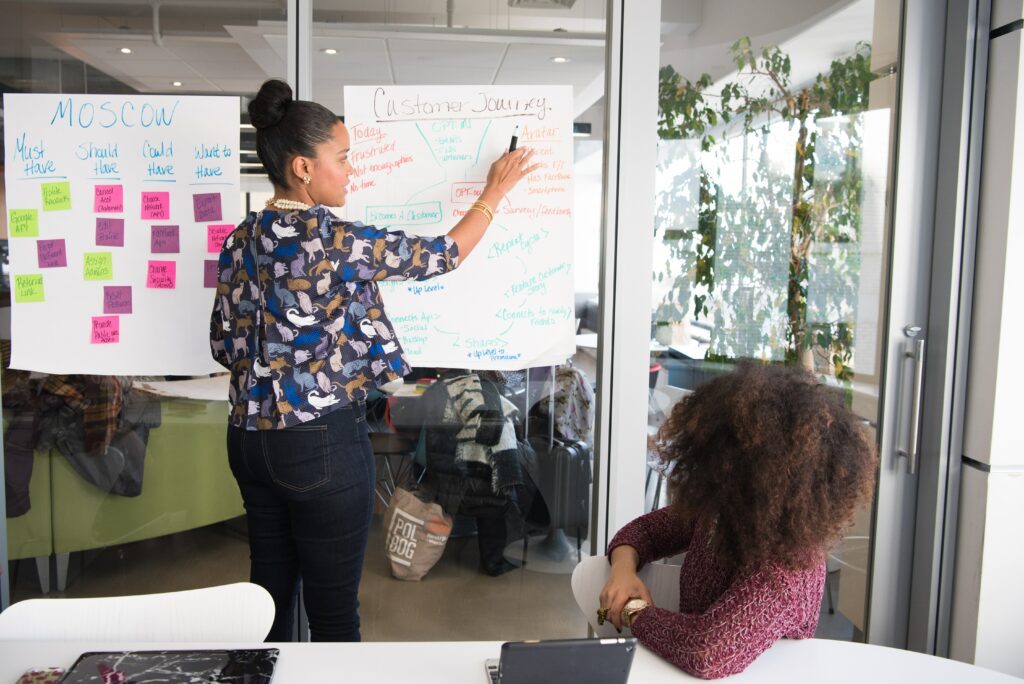AI and recruitment: how can AI facilitate communication between managers and their teams?
“AI not only increases what we can do, it allows us to reinvent processes, create new ways of working and collaborating.” – Satya Nadella, Microsoft CEO.
This transformation is particularly visible in recruitment, where AI brings innovative solutions to optimize interactions and processes.
Discover how artificial intelligence (AI) is revolutionizing recruitment by facilitating communication between managers and their teams, improving efficiency and job satisfaction.
AI and recruitment: why AI can become essential today ?
Artificial intelligence has transformed many aspects of recruitment, making processes faster and more accurate.
AI can analyze large amounts of data in a short space of time, identify the most qualified candidates and even predict future performance.
This allows recruiters to focus on more strategic tasks, such as communicating with candidates and managers.
One of the major advantages of AI in recruitment is its ability to reduce human bias.
AI algorithms can assess skills and qualifications objectively, without being influenced by unconscious bias.
What’s more, AI can automate repetitive tasks such as CV screening, freeing up time for more human and meaningful interactions.
How AI improve communication between managers and their teams?
AI plays a crucial role in improving communication within teams.
Here are just a few of the ways it facilitates this interaction:
- Centralized information : AI can bring together all relevant data on a single platform, giving managers easy access to candidate and employee information.
This simplifies decision-making and ensures greater transparency.
- Automated updates : Thanks to AI, managers can receive automatic updates on the recruitment process, employee performance and project progress.
This reduces the need for frequent meetings and enables more effective communication.
- Analysis of feelings/emotions : AI tools can analyze written communications to identify employees’ feelings and concerns.
This enables managers to intervene quickly when problems arise, and improve team well-being.
- Real-time feedback : AI can provide instant feedback on employee performance, enabling rapid adjustments and continuous improvement.
According to Bizneo, AI can “help identify skills and areas for improvement” in real time.
What are the concrete applications of AI in recruitment?
The applications of AI in recruitment are many and varied. Here are a few concrete examples:
- Recruitment chatbots : Chatbots can interact with candidates, answering their questions and guiding them through the application process.
They can also provide managers with real-time information on the status of applications.
- Predictive analysis AI algorithms can predict candidate performance based on historical data.
This makes it possible to select the most promising candidates and improve the quality of recruitment.
- Advanced matching AI can analyze candidates’ skills and compare them with the requirements of open positions.
This helps to find the best matches and speed up the recruitment process.
How does AI facilitate the integration of new employees?
Onboarding new employees is a crucial stage in the recruitment process.
AI can greatly improve this phase by offering personalized and efficient solutions.
- Automated onboarding programs AI can create customized onboarding programs for each new employee, based on their specific skills and needs.
This makes for faster, more efficient integration.
- Commitment follow-up : AI tools can track the engagement of new employees and identify signs of disengagement or difficulties.
Managers can then intervene quickly and offer the necessary support.
- Ongoing training Continuous training: The AI can recommend training and resources tailored to the needs of each employee, thus promoting their professional development and integration into the team.
What are the challenges of using AI in recruitment?
Despite its many advantages, using AI in recruitment also presents challenges:
- Data reliability The effectiveness of AI depends on the quality of the data used.
Inaccurate or biased data can lead to erroneous decisions.
- Algorithm transparency AI algorithms must be transparent and understandable to users.
Knowing how decisions are made is essential to ensure fairness and trust.
- User acceptance AI adoption can meet with resistance, particularly from recruiters and managers who may fear for their jobs or not trust the technology.
How overcome the challenges of AI in recruitment?
To overcome the challenges associated with AI in recruitment, it’s important to follow these recommendations:
- Improving data quality Make sure that the data used by AI is accurate, complete and free from bias.
This requires constant vigilance and regular updating of databases.
- Transparency and education AI: Clearly explain how AI algorithms work to users, and train them to use these tools.
Transparency and education are key to building trust.
- Involving users : Involve recruiters and managers in the AI implementation process.
Their feedback and active participation are crucial to ensure successful adoption.
AI is revolutionizing recruitment by facilitating communication between managers and their teams. This article testifies to this.
By centralizing information, automating updates, providing real-time feedback and analyzing emotions, AI helps create a more efficient and harmonious working environment.
However, overcoming the challenges of using AI is crucial to maximizing its benefits.
By following best practices and actively involving users, companies can take full advantage of AI to optimize their recruitment processes and improve employee satisfaction.
Good to know! quarksUp is an HRIS solution for managing the entire employee cycle.
Thanks to this HR tool, everything can be done online. As an HR manager, you’ll be in charge of all our employees’ digital activities. With its modular offer, quarksUp intervenes from recruitment to employee off-boarding.
You may also be interested in 😊

GPEC: Definition and implementation tools
What is GPEC (Gestion Prévisionnelle des Emplois et des Compétences) and how can it be implemented? quarksUp, expert in HRIS, answers your questions.

Annual appraisal interview: objective, grid
The annual appraisal interview is an opportunity to take stock of performance. quarksUp, expert in HRIS, guides you in preparing your objectives and evaluation grids.

